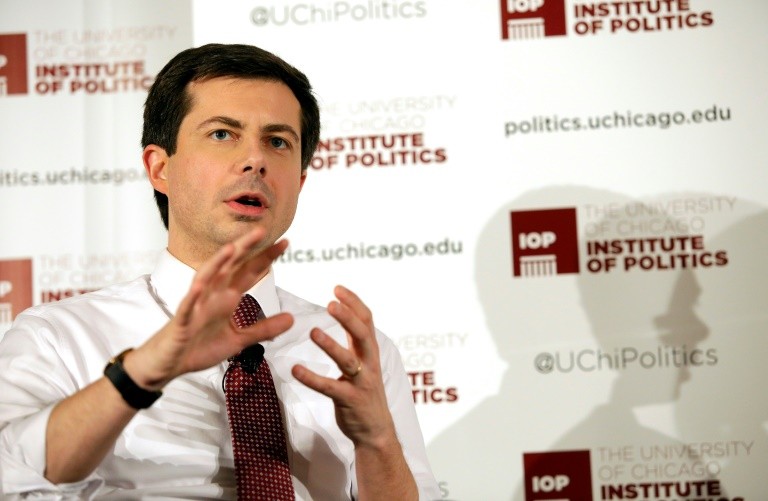MSNBC contributor Jason Johnson ripped the nearly all-white establishment media on Sunday for kissing presidential candidate Pete Buttigieg’s (D) “butt” because “they’re looking for a white guy who makes them feel good about themselves.”
In a conversation about white male Democrats like former Vice President Joe Biden, Sen. Bernie Sanders (I-VT), former Rep. Robert Francis “Beto” O’Rourke (D-TX), and Buttigieg—the South Bend, Indiana mayor— getting most of the media’s attention, Johnson, The Root‘s political editor, said frontrunners Biden and Sanders are deserving of the buzz unlike the more “mediocre” candidates like O’Rourke and Buttigieg.
“It’s Beto, Biden and Buttigieg. I mean, everybody’s been kissing his butt, too. It’s amazing to me. It’s because—let’s be candid, most of the reporters are white,” Johnson said of Buttigieg. “And they’re looking for a white guy who makes them feel good about themselves.”
Johnson argued that the inordinate amount of attention being given to “mediocre” candidates who have not accomplished much and are not “the most dynamic or interesting candidates” like O’Rourke and Buttigieg also “reflects a lack of diversity in the media.”
Johnson pointed out that Buttigieg, like Sen. Cory Booker (D-NJ), has a Rhodes Scholarship and is a mayor of a small city—“He’s just a white, gay version of Cory Booker. Right? And at least Cory Booker’s in the Senate.”
After the establishment media gave off the impression that they wanted to will Buttigieg into the top tier of candidates in recent weeks, even the establishment Washington Post had to concede that all of the buzz around Buttigieg has been “a little over the top.”
In Current Affairs, Nathan Robinson recently blistered Buttigieg’s record and hinted that journalists—many of whom see themselves in the liberal mayor from a red state who has perfected the art of “sounding smart” without really saying anything—are impressed by people like Buttigieg who go through life collecting accolades from one elite institution after another while playing the “meritocracy” game. The late John Wooden would have said these are the types of people who mistake activity for achievement.
Robinson, writing about Buttigieg’s “credentials,” said that “when journalists see ‘Harvard’ and think ‘impressive,’ I see it and think ‘uh-oh’:
Before I dive into Shortest Way Home’s account of the life and career of Peter Buttigieg, let me be up front about my bias. I don’t trust former McKinsey consultants. I don’t trust military intelligence officers. And I don’t trust the type of people likely to appear on “40 under 40” lists, the valedictorian-to-Harvard-to-Rhodes-Scholarship types who populate the American elite. I don’t trust people who get flattering reams of newspaper profiles and are pitched as the Next Big Thing That You Must Pay Attention To, and I don’t trust wunderkinds who become successful too early. Why? Because I am somewhat cynical about the United States meritocracy. Few people amass these kind of résumés if they are the type to openly challenge authority. Noam Chomsky says that the factors predicting success in our “meritocracy” are a “combination of greed, cynicism, obsequiousness and subordination, lack of curiosity and independence of mind, [and] self-serving disregard for others.” So when journalists see “Harvard” and think “impressive,” I see it and think “uh-oh.”
I try my best to be fair, though. I thought former Michigan gubernatorial candidate Abdul El-Sayed was suspect because of his shiny résumé. But after examining his proposals and listening to his speeches, I realized he was the real deal. He had done well in school, but he was genuinely outraged by preventable human misery, talked openly about taking on corporate oligarchy, and had bold plans for revolutionizing health care, environmental policy, and just about everything else. I have lots of friends who are the products of elite institutions, but became critical of those institutions after being exposed to their inner workings. If Pete Buttigieg is one of those, great!
Pete Buttigieg is not one of those.
Potential presidential candidate and failed Georgia gubernatorial candidate Stacey Abrams has also criticized the media for elevating mediocre white candidates who graduated from Ivy League schools like O’Rourke instead of failed Florida gubernatorial candidate Andrew Gillum and herself, adding that she believed race has played a role.
“There is no difference — there is no distinction with a difference between what he accomplished and what Andrew and I accomplished. I would challenge people to consider why we were not lifted up in the same way,” Abrams recently said on MSNBC of O’Rourke. “I think race plays a part. I think region plays a part. I also think phenotype plays a part. My responsibility is to investigate running for president because I want people to understand I may not look like the typical candidate, but that does not diminish my capacity to possibly run for the job. That would be true for Andrew if he was interested.”
